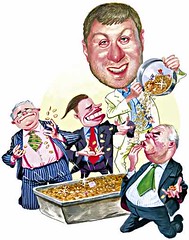
(image via spectator.co.uk)
Twilight of the Oligarchs. It's deja vu all over again, to paraphrase Yogi Berra, the hungry man's Friedrich Nietzsche (Averted Gaze). The corrupt "robber barons" of Russia are making slimy inroads into London High Society (among other places), according to The Spectator's cover story by Dominic Midgley:
"A senior member of the Chamber of Commerce in Moscow once said that any mention of the word 'oligarch' had the average Russian reaching for a gun. That's because much of the population is furious at the way the national wealth was passed to a handful of hustlers in a series of sweetheart deals qith Boris Yeltsin. In London, however, the word 'oligarch' produces a very different reaction, inspiring an enterprising collection of opportunists to reach for the telephone.
"Like the impoverished dukedoms who married the daughters of rich Americans in the 19th century, some of London's most blueblooded and blue-chip bankers, lawyers, art dealers and estate agents are willing to trade their standing for cash ... One man who has done very well out of his association with (Roman) Abramovich is Roddie Fleming, a merchant banker. After negotiating the sale of the family bank, Robert Fleming Holdings, to Chase Manhattan in 2000, he set up Fleming Family & Partners and began investing in the Russian minerals sector. A few years ago he put together a group of investors including Lord Daresbury, the Earl of Derby and Christopher Palmer-Thomkinson, uncle of Tara, to invest in a Siberian goldmine called Highland Gold.
"They were initially approached by a man who worked for Highland's then owner, Oil Finance, a company linked to Sibneft. He was keen to mount a management buy-out and was looking for capital. Fleming and his aristocratic partners duly took a 34 percent stake and in the first 18 months of their ownership the market capitalization of the company rose from ($ 70.7 million to $353.5 million), multiplying their stakes by a factor of five.
"The simple explanation for this state of affairs is that the normally sure-footed Abramovich misjudged the market and got out at exactly the wrong time. More cynical observers, however, suggest that he was prepared to lose cash to gain social cachet."
More of this fascinating article here (Subscription needed).
No comments:
Post a Comment